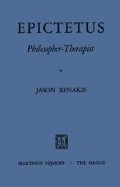Abstract
Epictetus sees the world as a unified totality. Each thing, he says, is part of a whole, “as the hour is part of the day” (II.5.13; IV.7.6). He quotes approvingly “the philosophers” who hold that
this world is one city and the substance, out of which it has been made, is one.... (III. 24. 10),
and goes so far as to endorse the pan-feeling doctrine, likewise early Stoic in character, though deriving from Pythagoras and Empedocles (Sext. Ag. Phys. I.127). His version is that
all things are united together... and earthly things feel the influence of heavenly ones (I.14. If; cp. 5).
Access this chapter
Tax calculation will be finalised at checkout
Purchases are for personal use only
Preview
Unable to display preview. Download preview PDF.
Rights and permissions
Copyright information
© 1969 Martinus Nijhoff, The Hague, Netherlands
About this chapter
Cite this chapter
Xenakis, J. (1969). Nature and God. In: Epictetus Philosopher-Therapist. Springer, Dordrecht. https://doi.org/10.1007/978-94-011-9060-2_4
Download citation
DOI: https://doi.org/10.1007/978-94-011-9060-2_4
Publisher Name: Springer, Dordrecht
Print ISBN: 978-94-011-8374-1
Online ISBN: 978-94-011-9060-2
eBook Packages: Springer Book Archive

